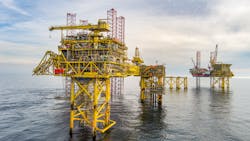North Sea Tyra restart delayed by issues at Batam yard
Offshore staff
ESBJERG, Denmark — First gas from the redeveloped Tyra Field in the Danish North Sea has had to be pushed back to the winter season 2023-2024 due to manufacturing and supply chain disruptions.
Since the redevelopment decision was taken in 2017, TotalEnergies and its partners in the Dansk Undergrunds Consortium (DUC) have been progressing activities in the Danish sector and at construction yards in Italy, Spain, Singapore and Indonesia.
Currently, seven of the eight platforms have been installed, with work underway to connect the new Tyra II facilities to the existing offshore infrastructure. The final major component to be installed will be the new process module, which McDermott is still fabricating in Batam, Indonesia.
Here the impact of the COVID-19 pandemic has continued to disrupt the supply chains and staffing levels at the yard, and some unexpected manufacturing issues concerning key equipment have added to the delays.
While the TEG module will sail from Batam in early September as planned to meet the scheduled time for the offshore installation, it will be transported directly to the Tyra Field by the heavy-lift vessel GPO Emerald, followed by a lift and installation by Heerema’s Sleipinir. It will leave the yard incomplete.
This means remaining construction work will be performed on arrival at the Tyra Field, requiring about 580,000 manhours of work, according to partner Noreco, and the mobilization of more than 500 additional personnel in the Danish North Sea, with a major impact on the project’s timelines.
Noreco said the overhang from COVID-19 had challenged the quality and progress at Batam, and the operator’s efforts in terms of mitigating actions had proven not to be sufficiently effective.
Although TotalEnergies has focused on optimizing the ongoing offshore activities at the Tyra Field, progress is behind the original plan and will be further impacted by the carryover scope of the arriving TEG, Noreco added.
So offshore productivity assumptions have had to be revisited, with several areas of potential improvements and learnings identified. These should have an overall positive effect on the offshore hookup and commissioning performance going forward, Noreco said.
The DUC partners are mindful of the critical energy supply situation in Europe and have pledged to restore production at Tyra as soon as possible. They will also look to increase short-term gas output in the sector from other DUC gas fields through optimizing existing production.
Martin Rune Pedersen, Country Chair for TotalEnergies Denmark, said, “We recognize the critical nature of the current energy crisis in Denmark and Europe. Therefore, we are mobilizing significant extra offshore resources to help compensate for the construction delays we have experienced at the contracted yard in order to restart Tyra.
“The redeveloped Tyra Field is a cornerstone in the future Danish gas production, which we are fully committed to delivering with urgency.”
TotalEnergies operates Tyra on behalf of DUC, a partnership between TotalEnergies (43.2%), Noreco (36.8%) and Nordsøfonden (20%).
Tyra is Denmark’s largest natural gas field and was a hub for processing and exporting more than 90% of the natural gas produced in the Danish North Sea prior to its redevelopment. The redevelopment was needed due to the impact of the field’s natural subsidence of the chalk reservoir on the platforms after many years of production.
The project involves decommissioning and recycling of the old Tyra platforms, recycling and extending the current platform legs on six of the platforms by 13 m with new topsides, a new process module, and a new accommodation platform.
Once back onstream, Tyra II should deliver 2.8 Bcm/year, about 80% of the forecast Danish gas production.
Tyra II will also secure continued production of natural gas with 30% less CO2 emissions, helping reduce Denmark’s and the EU’s dependency on Russian gas.
As a result of the schedule change, the expenditure budget for Tyra will likely rise. While TotaEnergies is in the process of preparing a formal budget for approval by the DUC partnership, it has indicated a gross budget to first gas of c. DKK24 billion (US$3.28 billion) and to project completion of DKK25.7 billion (US$3.51 billion).
The increase relates mainly related to higher expected costs on the hookup and commissioning and project management.
08.03.2022
